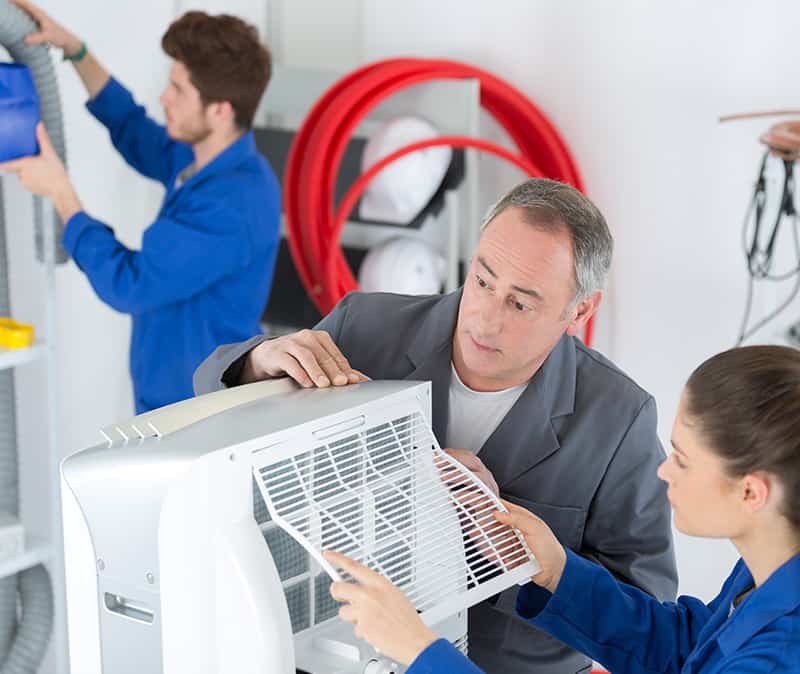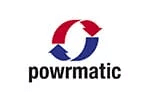Atmostherm are approved Powrmatic engineers and we have years of experience of installing Powrmatic heating systems.
Who are Powrmatic?
Powrmatic are a major brand that is known for modern and innovative products. It was established in 1949 and provides climate control solutions or HVAC solutions worldwide.
They design, develop, and deliver HVAC products for commercial and industrial uses, including heating systems. They specialise in warm air heating, radiant, and boiler-based products.
Types of Powrmatic heating systems
There is a range of heating options for commercial premises, which can make it stressful to find the best one for you. Each one should be assessed to ensure it is the best choice for your business.
Warm air heating systems
A warm air system takes cold air and runs it through a heat exchanger before distributing it. It is one of the most effective and energy efficient ways of heating industrial premises. A standard indirect-fired non-condensing warm air heater can give mini net efficiencies of 91% and with the latest models a minimum of 101%.
You can use a variety of fuel such as natural gas, LPG, or light fuel oil which means you can choose which one is most cost effective for your business.
A warm air heating system can be controlled to reduce heat and reduce cost.
Powrmatic developed air rotation heating, which are high powered fans moving large volumes of air at low velocities for some of their warm air products. This helps to better distribute the heat.
Pros:
- Quick and efficient
- Even distribution of heat
- Cost effective for large spaces
- Quieter option
- Relatively compact
- Low maintenance
- Flexibility as can mount on walls, from above, or stand on floors.
- Long lifespan with reduced risk of breakdowns.
Cons:
- You will need a separate water heater if you want hot water
- Initial investment can be high
- Without an air filter it is not suitable for those with allergies.

Radiant heating systems
This type of heating system uses tubes suspended from the ceiling to spread heat.
Instead of sending out warm heat like a radiator, it sends heat energy directly to people or objects in the area.
It is best suited to large industrial spaces, with high ceilings or large doors which are regularly open, such as warehouses.
Pros:
- Reduces heat loss in draughty areas
- You stay warm for longer
- The heat spreads fast
- Improves indoor air quality
- Highly efficient
- It has lower energy bills compared to air-based systems.
Cons:
- You need to be in the direct line of the heat to get benefit
- It’s inflexible, if your layout changes you will need to reconfigure the tubes
- Obstacles such as shelving can block the heat
- There’s a higher safety risk.
Destratification commercial heating
Destratification heating recirculates warm risen air and sends it to lower spaces. This type of system works with a warm air heating system.
Pros:
- Destratification fans can reduce energy consumption by 20%
- Effective distribution of heat
- Prevents over-heating to reduce costs
- Maintains required temperature with fewer air heaters, reducing costs
- Can be controlled independently of heating.
Cons:
- Can be noisy
- Only suitable for certain premises, such as warehouses and those with high ceilings.
- Needs perfectly positioned.
Commercial boiler systems
A boiler system uses electricity or burns fuel to heat water which is distributed through pipes.
Pros:
- Even heat distribution
- It can run for long periods of time
- It’s energy-efficient
- Easy to maintain and repair.
Cons:
- Slower to heat up
- Longer to cool
- Requires pipe installation throughout the building which can be an upheaval.
What to consider when choosing a Powrmatic heating system
Choosing a heating system for your business is a big investment and you need to know it is the right choice for your business.
When you are deciding on the best heating solution for your business, it is best to take the following factors into consideration.
- Initial investment
Some heating systems are more expensive than others for the initial investment, such as warm air systems. While this is a major factor in which system you choose, you must account for the long-term costs.
- Maintenance and running costs
Most heating systems won’t require a lot of maintenance but will need to be serviced at least once a year.
Some fuels are cheaper than others, and you may want to take this into account when working out the running costs.
- Energy efficiency and meeting sustainability goals
The latest heating system models will generally be pretty good at energy efficiency, but you also want to make sure whatever system you choose, suits your premises.
For example, if your premises is draughty, a radiant system prevents heat loss for this type of building whereas other systems may not be suitable.
- Brand reputation
It is best to go with a brand that you have heard of, that is well established, and that you can find reviews for.
A heating system is a big investment, and you want to go with a reputable brand that is experienced in heating systems.
- Size
Some heating systems are bulky and not suitable for smaller businesses. While Powrmatic are known for their compact designs, there may be solutions that don’t fit your establishment.
- Noise
If your business is a hotel or customer-facing business, you want your heating system to be quiet. A destratification system, for example, is generally noisier than other options, so this may not be suitable for your environment.
Types of Powrmatic products
Powrmatic have an extensive selection of heating systems including warm air heating, radiant heating, air rotation heating, destratification, electric quartz infrared heating, and aquamatic water heating.
How to find a Powrmatic engineer
Atmostherm are approved Powrmatic engineers that have years of experience of installing Powrmatic heating systems.
When choosing a Powrmatic engineer, check the following:
- Gas safe registered
- Experienced
- Specialising in the brand you are purchasing
- Can carry out installation according to CIBSE guidelines.
Any heating engineer you use should be Gas Safe registered. You can ask them about this but there should be a logo on their website along with any other qualifications they may have.
It is best to select an experienced engineer who is approved to install the brand you have chosen. This not only makes them experienced with that brand, but they can also offer extended warranties.
For more information on Powrmatic products, contact us today.

